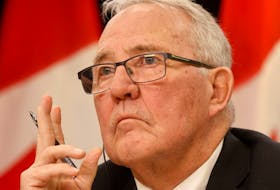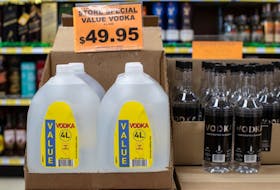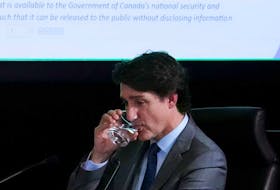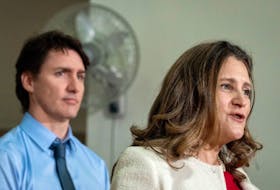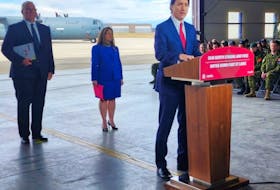As we confront what may prove to be the defining event of our lifetime, Michael Ryan’s call to action is proving persuasive for many policy-makers.
The World Health Organization’s rumpled Irish executive said the lesson he has learned after fighting numerous ebola outbreaks is that you need to move quickly and have no regrets.
“If you need to be right before you move, you will never win. Perfection is the enemy of the good when it comes to emergency management. Speed trumps perfection. Everyone is afraid of making a mistake, everyone is afraid of the consequences of error. But the greatest error is not to move and be paralyzed by the fear of failure,” he said.
The announcement by Justin Trudeau that Canada will close the border to non-Canadians (with the notable exception of Americans) suggests that message is permeating.
Last week, Health Minister Patty Hajdu told reporters that border measures are highly ineffective.
Public Safety Minister Bill Blair said that enhanced security measures at airports meant that the government was “taking the necessary steps” to keep Canadians safe.
The evidence was to the contrary in both cases. The WHO’s own guidelines suggest that travel measures are justified at the beginning of an outbreak, as they allow countries to gain time, even if only a few days, to implement preparedness measures.
Far from precautions at airports being enhanced, travellers returning home over the weekend reported they were not screened, tested, questioned or even told to self-isolate.
Telling people that your policies are working when they patently are not has the potential to damage confidence in government just when it is needed most. A poll by the charity Wellcome Trust last year suggested 78 per cent of Canadians have faith in government health advice, compared to just 63 per cent in Italy and 59 per cent in the U.S. If the Liberals lose further credibility over their dilatory response, regulating the spread of COVID-19 will become harder still.
The government has gone some way toward a course correction with the measures Trudeau announced on Monday – closing the border to non-residents; obliging airlines to give a basic passenger assessment for symptoms, and, limiting international flights to Canada’s four largest airports.
“Exceptional circumstances call for exceptional measures,” Trudeau said. Yet it was clear at least a week ago that we are living in extraordinary times and that speed should trump perfection.
Trudeau will come under fire for keeping open the American land border.
Canadians may have been lulled into a false sense of security by the relatively small number of confirmed cases
But as Deputy Prime Minister Chrystia Freeland pointed out, the border is a “lifeline”. Closing it might reduce the number of confirmed cases but we may end up starving in the dark.
The government’s next challenge will be to live up to Trudeau’s promise to ensure every Canadian has enough money to buy groceries and pay rent.
Chris Pilsworth, an Ottawa-based magician, is typical of self-employed individuals who suddenly have no income and no access to employment insurance.
He said he’s come through past crisis like 9/11 and the 2008/09 financial meltdown but the current crunch is unprecedented for performers. Entertainment work at trade shows, in schools, on cruise ships, at birthday parties and in clubs has dried up, virtually overnight. “I had six shows this week and they were all cancelled,” he said. “Part of the concern is that I don’t know how long it is going to last.”
There is a consensus across the political divide that the government needs to step forward – Alberta Premier Jason Kenney said Canada needs fiscal stimulus in the range of one per cent of GDP – or $20 billion. It would have been preferable if the deficit were not nearly $30 billion before the crisis hit. But low interest rates mean the economy could sustain deficits twice as big as they are now, in the short term.
The finance minister, the governor of the Bank of Canada and the banking regulator announced a $10 billion package of measures last Friday aimed at ensuring liquidity that should help companies to pay their workers and keep the lights on.
Bill Morneau is expected to unveil a parallel policy track on Tuesday designed to aid workers like Pilsworth, who have just experienced an income shock.
Jason Furman, a top economic advisor to Barack Obama during the Great Recession, said in an interview with Vox that the speed of the coronavirus means governments should not get caught up in designing clever, targeted policy. He said his policy preference would be to give people cash – a flat amount for adults and half for children.
“What’s the cost of doing too much and what’s the cost of doing too little? I think it’s incredibly asymmetric,” he said.
Unlike the financial crisis, underwriting markets is not going to spur recovery – a point made explicit by further carnage on Wall Street and Bay Street (the Dow Jones index was down a further 13 per cent; the TSX another 10 per cent on Monday). The health battle has to be won before stocks will bounce back.
The government’s next challenge will be to live up to Trudeau’s promise to ensure every Canadian has enough money to buy groceries and pay rent
Canadians may have been lulled into a false sense of security by the relatively small number of confirmed cases – 324 by Monday evening. But a press conference by Ottawa’s medical officer for health, Dr. Vera Etches, on Sunday suggested that the confirmed cases number should be treated with caution. She said that 10 people had been diagnosed in Ottawa but that some of those people had been walking around undiagnosed for weeks, so that hundreds of people could be infected in the city.
Canada has conducted just 34,000 tests – one for every 1,100 people (compared to one for every 200 citizens in South Korea).
One senior doctor in Toronto said it is hard to ramp up testing. “Those that need to be tested are able to be tested. Those that want to be tested are more of a challenge. More lab testing capacity is coming on line but there will always be a mismatch of supply and demand,” he said.
The small number of patients admitted to hospital for treatment means the resources are still available. “But I suspect this will ramp up in the coming days and weeks,” he said, ominously.
If COVID-19 is a very real threat to our health and wealth, the hardship should be put in perspective. If this is our darkest hour, then the vast majority of us will fight it, not on the beaches or the landing grounds, but from our couches and in our recliners. Settle back and ride out the storm.
• Email: [email protected] | Twitter: IvisonJ
Copyright Postmedia Network Inc., 2020


